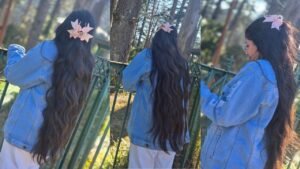Winter haircare is important to adjust your haircare routine and save your hair from harsh weather conditions. In this blog, you learn 16 haircare tips that will keep your hair healthy and happy during the coldest months of the year.
Winter is a beautiful season filled with cozy sweaters, hot chocolate, and snowflakes. However, it also brings along many challenges for your hair. The cold weather can leave your hair dry, frizzy, and lackluster.
However, with the right haircare routine, you can keep your locks looking luscious all winter long. In this article, you will learn 16 important winter haircare tips to protect your hair from the cold weather. So, grab a warm blanket, sit back, and get ready to give your hair the love they deserve!
16 Best Winter Haircare Tips for the Cold Weather
As the winter season approaches, it’s important to adjust your haircare routine to combat the harsh weather conditions. But, it’s equally important to understand how the cold weather affects your hair health.
How does Cold Weather affect Hair?
Before diving into the winter haircare hacks, it’s important to understand how cold weather affects your precious locks. Here are 3 ways your hair can suffer during the colder months of the year.
- The low temperatures and harsh winds can make your hair dry, brittle, and prone to breakage.
- The lack of humidity in the air can strip your hair strands of moisture, leaving them dull and lifeless.
- Cold weather can also lead to a dry scalp, which can be itchy and uncomfortable.
By knowing the effects of cold weather on your hair, you can now prepare yourself better to protect your locks from the winter elements.
Now let me share with you my 16 best winter haircare tips that you can follow to maintain healthy and hydrated hair throughout the chilly months of the year.
1. Wear a Hat or Scarf
Protect your hair from the drying effects of the cold weather by wearing a hat or scarf. This will not only keep your head warm but also shield your hair from the cold winds. It will also prevent moisture loss and maintain the natural oils in your hair. However, be mindful of the materials you choose.
Avoid hats or scarves that are made of rough or abrasive fabrics, as these can cause friction and lead to breakage. Opt for softer materials like silk, satin, or cashmere, which are gentler on your locks.
2. Use a Humidifier
Combat the dry indoor air caused by heaters by using a humidifier in your home. This will help retain moisture in your hair and prevent it from drying and unnecessary hair breakage.
3. Get Regular Trims
Schedule regular trims to prevent unnecessary split ends and maintain the health and length of your hair. Split ends also impact the growth of your hair. Thus, it is important to get regular hair trims every 6-8 weeks, as it will help prevent them from dryness and breakage.
4. Air Dry Your Hair
Colder months already make it hard for your hair to maintain its natural moisture. Hair styling tools just contribute to that and deteriorate your hair health. So, make sure you avoid using a blow dryer to dry your hair during the winter months. Instead, let your hair air dry naturally. This will not just keep your hair healthy but also minimize the damage and retain moisture.
5. Embrace Natural Hair Styles
Another way to protect your hair during winter is by minimizing your use of heat styling tools. Curling irons or hair straighteners can further dry out your hair and cause damage. I rarely use any hair styling tools on my hair as I am more of a braid babe and I like to experiment with new braided hair styles every time I am out. These are some of the recent braids I did.

You should also embrace your natural texture and opt for heatless hairstyles like braids, buns, or twists. If you do need to use heat styling tools, remember to apply a heat protectant spray beforehand to minimize damage. Also, make sure to use the lowest heat setting possible and limit your use of these tools to only when necessary.
6. Limit Hair Washes
Avoid washing your hair too frequently during winter, as it can strip away the natural oils that keep your hair hydrated. Opt for sulfate-free shampoos and try washing your hair every 2-3 days.
As the weather becomes colder, I like to wash my hair once every 4 days. Given the length and volume of my hair, it takes them an entire day to dry out in winter.
7. Fight Static
Winter weather often comes with its own set of hair woes, including static and frizz. The lack of humidity in the air can cause our hair to become staticky, while the cold temperatures can make our strands prone to frizz. However, with a few simple styling tips, you can keep static and frizz at bay.
Combat static and frizz by using leave-in conditioners and properly conditioning your hair. These products will help keep your hair smooth and manageable during the winter months. They help weigh down your hair and prevent static electricity from building up. You can also lightly mist your hair with water or a hydrating spray to add moisture and reduce static.
Additionally, avoid using plastic combs or brushes, as these can create more static. Instead, opt for wide-toothed wooden combs as they are natural and gentler on your hair.
You can also consider using a pea-sized amount of anti-frizz serum or hair oil to smooth down any flyaways and add shine.
8. Use Microfiber Towels
Swap your cotton towels for microfiber towels to reduce frizz and minimize breakage. Microfiber towels are gentler on your hair and help maintain its natural moisture.
9. Use Oil Treatments
The importance of hair oiling has been passed down over generations. There is nothing better for your hair than a good old hair massage with your favorite hair oil. So, give your hair the love and nutrition it deserves with a much-needed hydration boost by using oil treatments.
I just got my weekly hair massage done as I am writing this blog. I use my regular Dabur Anmol coconut oil to nourish my hair and give it all the love and care. It does wonders in maintaining my hair even during the colder months.
Olive oil and argan oil are excellent choices to restore moisture and improve the overall health of your hair.
10. Avoid Exposing Wet Hair to Cold
As wet hair is more delicate and fragile, the cold temperature can cause your hair to freeze and become more susceptible to breakage. Hence, you must avoid stepping out with wet hair during the winter season.
11. Protect Your Hair While Sleeping
Invest in a silk pillowcase to reduce friction and prevent hair breakage while you sleep. These materials are gentle on your hair and help maintain its moisture levels.
12. Build a Healthy Diet
When it comes to maintaining healthy hair, what you put in your body is just as important as what you put on your hair. Nutrition plays a crucial role in the health and vitality of your locks, especially during the winter months.
So make sure to include foods that are rich in vitamins and minerals that are beneficial for hair health.
Foods that are high in biotin, such as eggs, nuts, and avocados, can help strengthen your hair and promote growth.
Foods rich in omega-3 fatty acids, such as salmon, chia seeds, and walnuts, can help nourish your scalp and reduce inflammation.
Lastly, foods that are high in vitamin C, such as oranges, strawberries, and bell peppers, can help boost collagen production and promote healthy hair growth.
13. Stay Hydrated
One of the most important aspects of winter haircare is ensuring that your hair stays hydrated. So, remember to drink plenty of water throughout the day to keep your hair and scalp hydrated from within. Proper hydration is essential for maintaining healthy hair during the winter months. Consider adding hydrating foods to your diet, such as watermelon, cucumber, or citrus fruits.
To combat the dryness caused by the cold weather, you can also incorporate moisture-rich products into your haircare routine. Look for shampoos and conditioners that are specifically formulated for dry or damaged hair. These products often contain ingredients like argan oil, shea butter, or coconut oil, which can help nourish and hydrate your locks. Additionally, using a leave-in conditioner can provide an extra layer of moisture and protection.
14. Deep Conditioning
Include deep conditioning treatments into your winter haircare routine. Use a nourishing hair mask once a week to provide intense hydration and repair any damage caused by the cold weather.
15. DIY Your Hair Mask
In addition to your regular shampoo and conditioner routine, including hair masks in your winter hair care routine can provide an extra boost of nourishment.
Hair masks are deep conditioning treatments that can help restore moisture, repair damage, and improve the overall health of your hair. There are many store-bought options available, but you can also create your DIY hair masks using natural ingredients from your kitchen.
Here are two options I usually swear by for my thick and healthy hair:
a. Coconut oil hair mask
Warm up a few tablespoons of coconut oil until it is in liquid form. Apply it to your hair, starting from the roots and working your way to the ends. Wrap your hair in a towel or shower cap and leave it on for at least an hour, or overnight for a more intense treatment. Coconut oil is known for its deep conditioning properties and can help repair and strengthen your hair. This is what I always stick to for my hair health.
b. Banana and honey hair mask
Mash one ripe banana and mix it with two tablespoons of honey. Apply the mixture to your hair, focusing on the roots and the lengths. Leave it on for 30 minutes, then rinse thoroughly. Bananas are rich in potassium and vitamins, while honey is a natural humectant that can attract and retain moisture in your hair.
16. Give your dry scalp some tough love
Dry scalp is a common problem during the winter months. It can be itchy, flaky, and uncomfortable. Fortunately, there are several steps you can take to prevent and treat dry scalp.
First and foremost, it’s important to keep your scalp moisturized. This can be done by using a moisturizing shampoo and conditioner that are specifically formulated for dry scalp. Look for products that contain ingredients like tea tree oil, aloe vera, or jojoba oil, as these can help soothe and hydrate your scalp.
Avoid using hot water when washing your hair, as this can strip away natural oils and exacerbate dryness. Instead, opt for lukewarm water and rinse thoroughly to ensure that no product residue is left behind.
You can also prevent dry scalp by exfoliating your scalp regularly. Just like your skin, your scalp can accumulate dead skin cells and product buildup, which can lead to dryness and flakiness. You can use a scalp scrub or create your own by combining brown sugar with a carrier oil like coconut oil or olive oil. Gently massage the scrub onto your scalp in circular motions, then rinse thoroughly. This will help remove any buildup and promote a healthier scalp.
How to Choose the right shampoo and conditioner for winter haircare?
When it comes to winter hair care, choosing the right shampoo and conditioner is crucial. Look for products that are specifically formulated for dry or damaged hair, as these will provide the extra moisture your locks need during the cold weather.
Avoid shampoos that contain harsh sulfates, as these can strip your hair of its natural oils and exacerbate dryness. Instead, opt for sulfate-free shampoos that are gentle and nourishing.
Conditioners, on the other hand, should be rich and moisturizing. Look for products that contain ingredients such as shea butter, argan oil, or glycerin, as these can help hydrate and soften your locks.
Consider using a leave-in conditioner for added moisture and protection. This will help seal in the moisture from your regular conditioner and provide a barrier against the dry winter air.
How do Essential oils Work on Hair for Winter Haircare?
Essential oils are a wonderful addition to any winter hair care routine. They not only provide a beautiful aroma but also offer numerous benefits for your hair and scalp.
a. Tea tree oil
Tea tree is one of the most popular essential oils for hair care. It has antibacterial and antifungal properties, which can help combat dry scalp and dandruff. Additionally, tea tree oil can help soothe itchiness and inflammation, making it a great choice for those with sensitive scalps. To use tea tree oil, simply add a few drops to your shampoo or conditioner, or dilute it with a carrier oil like coconut oil and massage it into your scalp.
b. Lavender oil
Lavender oil is another essential oil that can benefit your hair and scalp during the winter months. It has a calming and soothing effect, which can help reduce stress and promote relaxation. Additionally, lavender oil can help balance oil production, making it suitable for both dry and oily scalps. You can add a few drops of lavender oil to your shampoo or conditioner, or create a DIY hair mist by mixing it with water in a spray bottle.
c. Rosemary oil
Rosemary oil is known for its stimulating and invigorating properties, making it a great choice for promoting hair growth. It can help improve blood circulation to the scalp, which in turn nourishes the hair follicles and promotes healthy hair growth. To use rosemary oil, dilute a few drops with a carrier oil like olive oil or jojoba oil, and massage it into your scalp. Leave it on for a few hours or overnight, then rinse thoroughly.
Conclusion
Winter brings its own set of challenges when it comes to hair care, but with the right tips and tricks, you can keep your locks looking luscious all season long.
With these 16 winter haircare tips, you can ensure that your hair remains healthy, hydrated, and protected throughout the cold season.
By adjusting your haircare routine and incorporating these practices, you’ll be able to enjoy luscious locks even in the harshest winter weather. Remember, prevention is key, so start implementing these tips early to maintain the health and vibrancy of your hair all winter long.
Include these winter haircare tips into your routine this season and give your hair the love they deserve!




